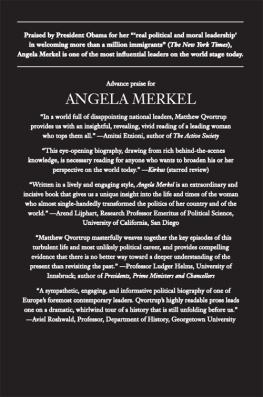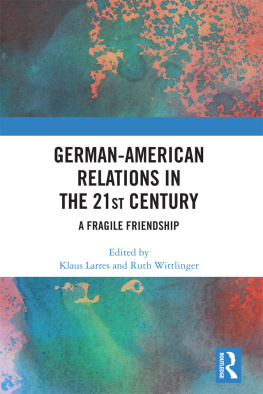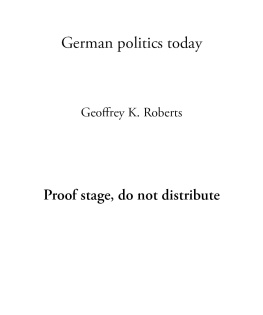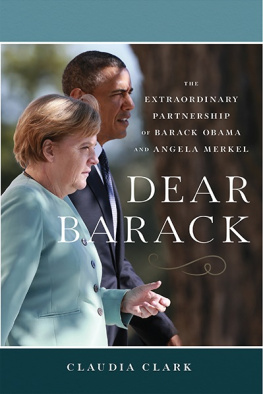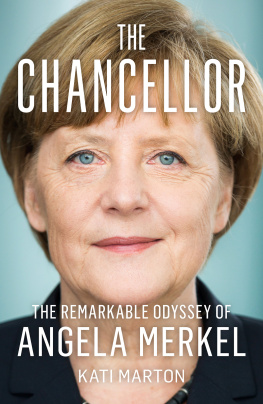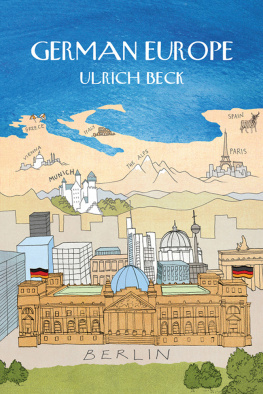This edition first published in hardcover in the United States and the United Kingdom in 2016 by Overlook Duckworth, Peter Mayer Publishers, Inc.
N EW Y ORK
141 Wooster Street
New York, NY 10012
www.overlookpress.com
For bulk and special sales, please contact ,
or write us at the above address
L ONDON
30 Calvin Street
London E1 6NW
www.ducknet.co.uk
Copyright 2016 by Matthew Qvortrup
All rights reserved. No part of this publication may be reproduced or transmitted in any form or by any means, electronic or mechanical, including photocopy, recording, or any information storage and retrieval system now known or to be invented, without permission in writing from the publisher, except by a reviewer who wishes to quote brief passages in connection with a review written for inclusion in a magazine, newspaper, or broadcast.
ISBN: 978-1-4683-1408-3
Matthew Qvortrup
ANGELA
MERKEL
EUROPES MOST INFLUENTIAL LEADER
with 14 color photographs
I n 2015 Time named German Chancellor Angela Merkel as its Person of the Year, leaving little doubt that the woman who has held control of the European Union and successfully negotiated with Russian President Vladimir Putin is one of the most crucial and formidable fixtures in contemporary politics. Angela Merkel is the riveting story of the political titans ascent from complete obscurity to become one of the most influential leaders in the world, responsible for making Germany more liberal and prosperous than it has ever been.
Matthew Qvortrup weaves together Merkels personal story with the vivid history of post-World War II Germany, combining his years of experience as a political commentator and journalist with his unique access to groundbreaking materials on Merkelhis research relies on original German sources and archives that have never been made available in English.
This definitive biography follows Angela Merkel from her bleak childhood in East Germany through her meteoric rise to prominence and power, and includes up-to-date information on recent pressing concerns, such as the current refugee crisis. Offering an unprecedented look at how Merkels inimitable personality and perspective allowed her and her staff of mostly female advisors to repeatedly outmaneuver a network of conservative male politicians, Angela Merkel is essential reading for anyone interested in politics and current affairs, or simply in the story of a truly remarkable woman.
To Anne
I would like to thank friends and family members, especially my father Steffen (who always reminded me if I failed to conjugate German words correctly) and Nina, Sebastian and Fred, who read early drafts.
While this is not an official biography, Angela Merkels office in the Kanzleramt has been helpful and courteous and has responded promptly to emails and clarifying phone calls. I am also grateful to my German colleagues Dr Barbara Hans (Der Spiegel), Dr Monika Pater (Institut fr Journalistik und Kommunikationswissenschaft, Hamburg University) and Professor Dr. jur. Hellmut Wollmann (Humboldt University, Berlin) for suggestions.
I want to thank my editors Peter Mayer and Nikki Griffiths for stimulating and valuable conversations. I am very grateful to my agent Michael Alcock, whose patience and professionalism is legendary. Above all I am grateful to Anne, who endured the presence of another woman in the household for several years: Angela Merkel. I dedicate this book to Anne.
It might all have been very different if Angela Merkel had not arrived at exactly the same time as Chancellor Schrder on the election night of 18 September 2005. In fact, as if by fate, the two politicians turned up simultaneously for the traditional post-election debate between the party leaders at the Zollernhof television studio in Unter den Linden, a famous avenue in Berlin. An usher opened the door for Mrs Merkel, the Leader of the Opposition, with a Welcome, Mrs Chancellor.
Shes not the Chancellor, I am, erupted Gerhard Schrder, the incumbent Chancellor of Germany since 1998. Flustered and enraged, the Social Democrat politician entered the television studio in a state. Do you seriously believe that my party will enter into negotiations with Mrs Merkel? thundered Schrder. He was used to testosterone-fuelled, bare-knuckle political brawls. But Angela Merkel just sat there as if to say, Thats no way to speak to a lady. She won the sympathy vote of the people. Schrder effectively lost the chancellorship when he lost his temper at the entrance to the Zollernhof.
Not for the first time, Merkel had used her political intuition to outsmart her opponent. The woman who had not managed to win the election outright suddenly had the upper hand in the negotiations. She had won the approval of the public. A few weeks later Angela Dorothea Merkel (ne Kasner) was sworn in as the first female federal Chancellor of Germany and began her journey to become the most powerful politician in the Old World, effectively the Queen of Europe.
The first major biography written in English, this book tells the story of a professional and focused leader, sometimes referred to as the mathematician of power, revealing the personality, passions and past of the nondescript, meek quantum physicist who rose from political nothingness to the summit of power in only a matter of months. It traces the life and times of a woman of Polish origin who grew up in a Communist dictatorship, a one-time squatter and barmaid who became Chancellor of Germany. The story has not often been told, certainly not in English: People know practically nothing about 35 years of my life, she said in an interview with Stern on 18 November 2004. Twelve years later this is still substantially true. Many will know that she grew up in East Germany, that she studied natural sciences and that she is Germanys first female Chancellor. But other parts of her life are less well-known. The fact that she has a wicked sense of humour and a knack for imitating voices including the Popes may come as a surprise to many. It might also surprise some that she was shaped by a Christian upbringing. These facts, and others to be revealed in this book, have not previously been discussed in the shorter books about her, written or published in English.
At the end of 2015 Angela Merkels image changed: once the tough taskmaster of austerity, she was now the only major leader in Europe to open her countrys doors to large numbers of refugees. Germany took in more than a million refugees in 2015. Merkel, who had hitherto been known as a cautious leader who preferred thorough analysis to rash and impulsive action, appeared transformed. She seemed to relish her new role as the creator of a culture of welcome for these new citizens. Was this a radical break with the past? What had happened? Had she lost her touch? Many of her own turned against her. Was this yet another proof of the iron law of government that all political careers end in failure?
Only a few months before, it had seemed she could do no wrong. Praise for her was almost universal in other Western capitals. We live in the Age of Merkel, as British pundit Alastair Campbell noted. Mrs Merkel had shaped Europe and become a cultural icon.
We may toy with the hypothetical question: what if Merkel had not been Chancellor? We will never know, but the fact remains that she was a prominent leader at a key moment in European history. Her style of government, and the way she steered her country and the European continent through crisis after crisis was in large measure shaped by her past and her earlier experiences as an underestimated politician who was considered a lightweight by her male colleagues. She surprised them all with her tenacity and her very different style. Of course, she too made miscalculations. Her commitment to the refugees and her newfound passion for the huddled masses from the Middle East did not endear her to the political right, or indeed to many of her party colleagues. Yet at this late stage of her career she seemed prepared to follow policies she considered to be morally right notwithstanding their unpopularity.

